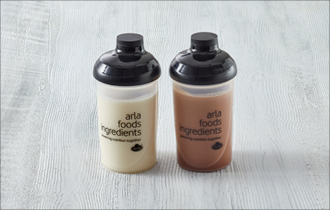Healthy weight - It´s more about quality than quantity
A healthy weight is not about the quantity of the kilos in relation to height, but about the quality of these kilos in relation to the body composition. A healthy weight thus refers to a healthy body composition, where there is a healthy balance between the fat and fat-free masses (mainly muscle) in the body.
Reaching a healthy body composition is important for optimal body functioning, mobility, vitality and quality of life. Research increasingly confirms that an unhealthy body composition is linked to higher risks of suffering type 2 diabetes, metabolic syndrome, cardiovascular diseases and sarcopenia, and as a consequence impose severe, long-term consequences to health.
Weight management – a dual challenge
For many people weight management includes the dual-challenges of
- Weight loss: Reaching a target weight by losing kilos/fat
- Weight maintenance: Maintaining the target weight after successful weight loss.
Muscle represents the major part of the body’s fat-free mass and effectively consumes energy (burn calories). Therefore gain or loss of muscle mass will either accelerate or decrease the body's energy expenditure. Healthy weight-loss strategies should effectively reduce fat-mass while maintaining/preserving muscle mass.
Nutrition modulates your body
Along with leading an active lifestyle, nutrition is an essential tool for modulating the body's composition, whether the target is to increase muscles or reduce fat.
A growing body of scientific evidence shows that the introduction of higher protein diets, that include high quality proteins, like whey, help support weight management and improvements in body composition (e.g. loss of body fat and/or preservation of muscle).
Dairy contains several nutritional compounds that offers an additional beneficial effect in relation to weight management and healthy weight approaches i.e. high quality proteins and calcium.
The advantage of whey protein for a healthy weight
Research shows that whey protein intake serves as a valuable tool for successful weight management.
Whey proteins are highly nutritious and complete proteins, meaning they provide all the essential amino acids (EAA) needed by the human body. Compared to other protein sources, whey proteins provide a higher proportion of the EAA and in particular, the branched-chain amino acids (BCAA), known to effectively stimulate muscle synthesis. In addition whey proteins are easily digested and absorbed by the human body.
During weight loss, whey protein helps reduce body weight, waist circumference and fat mass while preserving lean body mass.
In addition, whey protein help curb hunger and build lean muscle mass. Alpha-lactalbumin is a unique whey protein especially rich in tryptophan, EAA, and has been shown to have an increased effect on satiety.
The advantage of milk calcium for a healthy weight
Dairy is known to be a rich dietary source of milk calcium and other compounds, e.g. proteins, minerals and vitamins, which support general health and benefit bone development.
Milk calcium is bioavailable, i.e. can be absorbed and utilized by the body, and numerous studies support the hypothesis that increased intake of milk calcium positively influence body weight and weight maintenance.
It is believed that intake of milk calcium from dairy may help reduce body weight and support weight maintenance, by regulating fat metabolism and promoting increased excretion of fat/energy in the intestine in relation to a high-fat meal.





